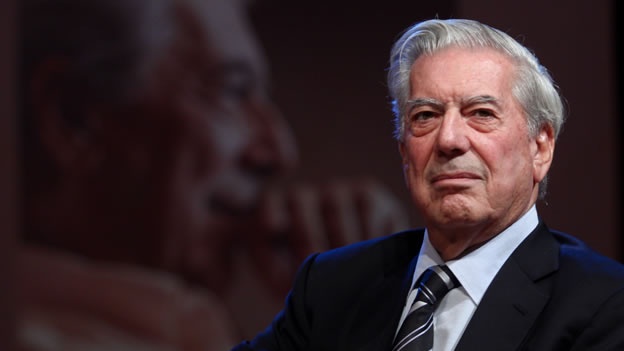Events in Ukraine are inspiring all the democratic forces in the world to struggle against dictatorship, Mario Vargas Llosa, the 2010 Nobel Prize winner for literature, said at the Taras Shevchenko National University in Kyiv, November 11.
He emphasized that it is very important for Ukraine to become integrated into Europe and to live in peace since dictatorships that still prevail in the world are threatened by the spirit of freedom.
"The spirit of criticism must not disappear. There is the spirit of criticism, the right to criticize and to disagree with institutions. There is a desire for reform, for change. This is freedom and it must exist. On the one hand there is criticism and on the other the attempt to destroy. The dictatorships that still exist in the world find the existence of such a large community based on the spirit of freedom very frightening. This is why it is necessary to do everything possible for this reality to happen," he said.
Llosa explained that he wanted to witness Ukraine's struggle for freedom himself. "I really wanted to come here because in recent months Ukraine has become a center watched by the entire world," he said. "Right now Ukraine is going through very difficult times, but these are times of struggle for freedom, for democracy and the rule of law. One of the reasons why I wanted to come to Ukraine so much is because of the civil society that wants to put an end to authoritarian tradition. They do not want more Russian interventions and corruption. They are sick of politics that is only a means of personal enrichment. I saw from up close how people are mobilizing for freedom."
Unfortunately, according to Llhosa, Europe is not providing sufficient support for Ukraine.
"Of course, if Putin insists on creating this artificial Novorossiya republic that becomes the Russian enclave in Ukraine, its entire purpose will be to show the failure of democracy in Ukraine," he said. "I think that Europe has not demonstrated sufficient support and solidarity towards Ukraine. For me the Russian initiative is undoubtedly colonial. This is why I think it is very important (for Ukrainians) to feel support and solidarity. In many governments there is a certain reluctance to show open opposition to Russia, but I believe the time has come to say enough."
However, Llhosa is convinced the Ukrainian issue has mobilized and brought together the intellectuals of the world.
"Ukraine has lived a heroic past, and most Ukrainians want to become members of this Europe that is being built on the basis of freedom and culture. In spite of the difficult times that we are experiencing now, this project is very important for Europe and for freedom around the world. This is why what has happened in Ukraine is known everywhere […] I don't know if you understand that the intellectuals of Europe, the US, and Latin America have become mobilized. They have solidarity, and they are very critical of Putin's Russia and the violence that rules there. They look positively at the integration and democratization of Ukraine," he said.
Mario Vargas Llosa received the Nobel Prize for literature in 2010 "for his cartography of structures of power and his trenchant images of the individual's resistance, revolt, and defeat." He is considered one of the leading Latin American writers of the twentieth century along with such innovators as Jorge Luis Borges, Gabriel Garcia Márquez, and Julio Contázar.

